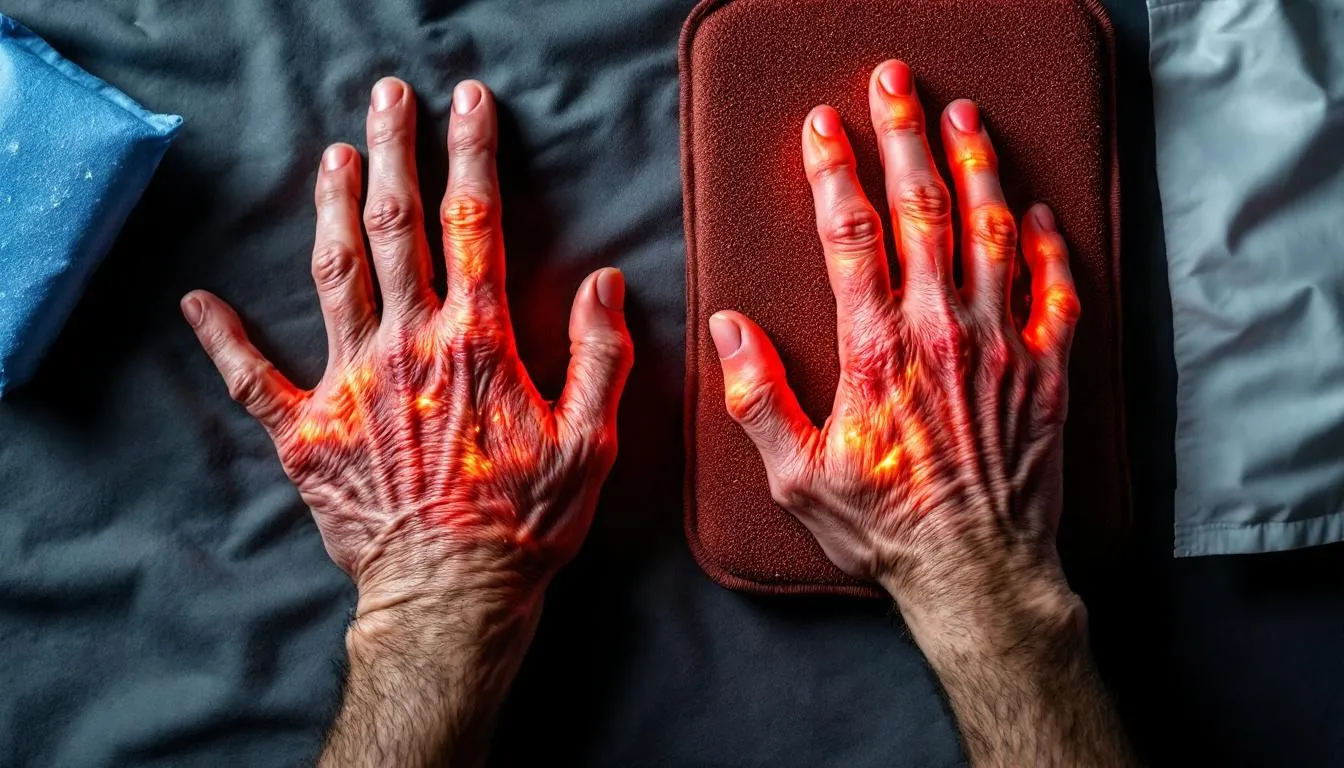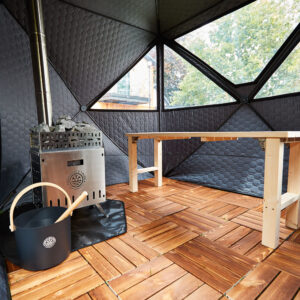
Ice Baths: A Key to Enhanced Recovery and Vitality for Athletes
Explore how ice baths can boost recovery and enhance vitality for athletes. Discover practical tips and insights to elevate your performance. Read more!
Christmas Delivery: UK orders by 10am, 19th Dec. Ireland/EU by 12pm, 15th Dec. Dispatch resumes 2nd Jan.
Spend Over £500 To Get Free UK Delivery - Excludes Certain Postcodes & Round Ice Baths
Delivery to Ireland now available

One recurring question among arthritis sufferers is whether to use heat or cold therapy. Both methods have their merits and drawbacks, and the choice often hinges on your unique pain experience and symptoms. We’re about to explore this topic in depth, offering you insights that could potentially transform your arthritis management strategy. Stay tuned.
Ever wondered how you can navigate arthritis relief naturally? One of the simplest ways to do so is through heat and cold therapy.
Heat therapy works wonders in relieving pain by increasing blood circulation and relaxing your muscles. You can use heat pads or warm baths to experience this benefit.
On the other hand, cold therapy can reduce inflammation and numb the painful area. A cold pack or an ice bath could be your go-to method.
While tackling arthritis pain, it’s essential to understand what’s actually happening inside your body.
Arthritis pain typically stems from inflammation in your joints. This inflammation can damage your joints over time, leading to persistent pain and discomfort. You might also experience muscle strains around your aching joints, which can amplify your pain.
Now, if you’re looking for ways to combat this pain, heat and cold therapy come into play. Heat therapy can help relax your muscles, thereby reducing joint pain. On the other hand, cold therapy can potentially reduce inflammation, offering relief from arthritis pain.

Living with arthritis isn’t just about managing pain; it dramatically affects your everyday life.
Every morning, you might wake to arthritis symptoms like stiffness and pain, making simple tasks like opening a jar or walking up stairs a challenge. The constant discomfort can interfere with your work, hobbies, and even your relationships.
Pain relief often becomes a priority, and effective strategies can greatly improve your quality of life. Heat therapy can be beneficial in reducing stiffness, making those first morning steps a little easier.
Yet, it’s important to remember that each person’s experience with arthritis is unique. It’s about finding the right balance and what works best for you in managing your arthritis symptoms.
As you navigate the journey of chronic pain, it’s crucial to understand the intricate mind-body connection. Your mental state can indeed influence your perception of pain, and vice versa.
In crafting your arthritis management plan, remember that there’s no one-size-fits-all solution. The power of personalisation is key in soothing arthritis pain.
This means considering your unique experiences and responses to heat or cold, and figuring out the right balance. Heat may provide comfort and ease stiffness, while cold can reduce inflammation and numb pain.
Experimenting and observing how your body reacts to both can guide you toward a regimen that helps manage arthritis pain most effectively. Communicate with your healthcare provider about your findings, too. They can offer valuable insights and adjustments to your plan.
The goal is to create a treatment method tailored to you, enhancing your ability to live less hindered by arthritis.

While you might commonly associate heat with comfort and relaxation, it’s also a powerful tool in managing arthritis pain. Heat therapy works by increasing blood flow, relaxing stiff joints, and reducing discomfort.
Here’s how and when to use it:

Though heat therapy has its merits, don’t overlook the potential benefits of its polar opposite: cold therapy. When it comes to managing your arthritis, cold therapy works wonders. It can help reduce swelling and soothe your painful joints by numbing the affected area, thereby decreasing the sensation of pain.
To apply cold therapy, you might use ice packs or immerse the affected area in cold water. Remember, moderation is key. Don’t apply cold therapy for more than 15 minutes at a time, and always protect your skin with a cloth or towel.
Don’t let arthritis control your life. With the right management strategies, including the strategic use of cold therapy, you can maintain a high quality of life.

Steering through arthritis pain means understanding what works best for your unique body and condition.
Heat and cold therapies can both be effective, but their impact varies with different arthritis types.
Exploring heat and cold therapies can significantly alter how you manage varying arthritis types, ensuring effective pain control.
After understanding the individual impact of heat and cold therapies on different types of arthritis, it’s time to explore an integrated approach.
Combining exercise with heat and cold therapy can enhance your arthritis relief strategy. Regular exercise increases joint flexibility, reduces stiffness, and aids in weight control, which can lessen the burden on your joints.
Heat therapy can help prepare your body for exercise by relaxing your muscles and increasing circulation. After exercise, cold therapy can reduce inflammation and soothe your joints.
Remember, it’s not about choosing one method over the other, but rather understanding how exercise, heat therapy, and cold therapy can work together for maximum arthritis relief.
Your journey to better mobility and less pain is a holistic one.
Building your personalised arthritis relief strategy doesn’t have to be overwhelming.
Creating a custom arthritis relief plan need not be a daunting task.
It’s about understanding your body’s responses and experimenting to find what works best for you.
Here’s a simple strategy to get started:
While managing pain is a crucial aspect of living with arthritis, a truly holistic approach goes beyond just treating symptoms.
It’s about addressing the whole person, including physical, emotional, and mental health. Heat therapy, for instance, can help alleviate joint stiffness, while cold therapy can reduce inflammation. This combo may offer you a respite from the relentless discomfort.
But remember, pain management is just one piece of the puzzle. Living with arthritis also means making lifestyle adjustments that support overall well-being. Regular exercise, a balanced diet, and adequate sleep can make a world of difference.
In the end, it’s about finding routines that suit you best, helping you lead a fuller, more comfortable life.
So, where does the Urban Ice Tribe perspective fit into this?
Well, they prioritize cold therapy, but also acknowledge the benefits of heat therapy.
Here’s what you need to know:
Besides heat and cold, you can also try natural therapies like gentle exercise, massage, and acupuncture. These methods, combined with a healthy diet, can help manage your arthritis pain and improve your overall wellbeing.
Yes, diet can greatly impact arthritis pain. Eating anti-inflammatory foods like fish, nuts, and fruits can reduce inflammation. Conversely, processed foods can increase inflammation. It’s about making smarter choices for your body.
Cold therapy can considerably improve your mental health. It triggers your body’s “fight or flight” response, releasing endorphins. This can elevate your mood, increase mental clarity, and enhance your pain tolerance, helping manage chronic arthritis pain.
You should alternate between heat and cold therapy for arthritis daily. Heat therapy is ideal for stiffness while cold therapy aids with inflammation reduction. Always listen to your body’s response and adjust accordingly.
No, cold therapy isn’t suitable for all types of arthritis. It’s most effective for acute inflammation. If your arthritis causes chronic stiffness, heat might be more beneficial. Always consult your healthcare provider before starting a new therapy.
Journeying through arthritis is like sailing an unpredictable sea. Your pain, the stormy waves, and your relief methods, the anchor. Whether heat warms your stiff muscles like a comforting sunrise, or cold numbs your pain like a cool breeze, it’s your voyage to chart. Remember, blending therapies may create the perfect climate for your comfort. It’s all about finding your unique balance. So, hoist your sails, brave the storm, and sail towards the horizon of personalised arthritis relief.

Founder of Urban Ice Tribe

Explore how ice baths can boost recovery and enhance vitality for athletes. Discover practical tips and insights to elevate your performance. Read more!

There’s nothing quite like the raw, elemental power of a pop-up sauna. Portable, authentic, and deeply restorative, it’s the perfect way to reconnect with nature and yourself. But to take your sauna ritual to the next level, the right sauna accessories can make all the difference.

Transform your outdoor space into a personal wellness retreat with the Urban Ice Tribe Sauna Tent. This detailed setup guide walks you through every step, from unboxing to your first steam session, blending practical instruction with the mindful ritual of heat therapy.
Helping men & women release anxieties & limiting beliefs to experience a life of freedom using powerful breathwork, cold water therapy, movement & sound healing.

No spam, notifications only about new products, updates, offers and announcements.